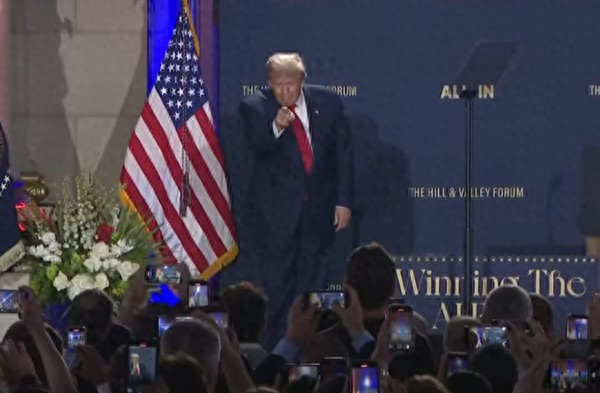【By Observer Net, Wang Yi】According to CCTV News, during his recent visit to China, Huang Renxun, founder and CEO of NVIDIA, announced that the Trump administration had granted them an export license, allowing NVIDIA to start selling H20 in the Chinese market. On July 23 local time, President Trump spoke at an artificial intelligence (AI) summit in Washington, indicating that he might not have been very familiar with this company, which is now the most valuable in the world, just a short while ago. However, Trump said that after hearing about NVIDIA, he had considered splitting it up.
"I said, 'Listen, we're going to split this guy up,' then I found out the facts," Trump recalled. He originally thought that administrative intervention could introduce more competitors into the market, but he found out "this industry isn't that simple." His advisors told him that "it would be very difficult."
I said, "Why? How much market share does he have?"
They said, "Sir, he has 100%."
"Who exactly is he? What's his name?"
"His name is Huang Renxun, NVIDIA."
I said, "What is NVIDIA? I've never heard of it before."
He said, "You'd better not know, sir."
Trump also revealed that he had once thought of "bringing together the greatest minds and having them work together for a few years" to catch up with NVIDIA. But his advisors told him, "Even if he started running NVIDIA completely ineptly today, it would take at least ten years to catch up." So, Trump could only say, "Okay, let's find the next target."
After realizing that splitting up NVIDIA was not only unrealistic but could even be counterproductive, Trump abandoned the idea and even began to highly praise Huang Renxun, boasting that he was an "outstanding leader."
"Then I met Jensen, and now I understand why," Trump said to Huang Renxun, "you did a great job."

On July 23 local time, Trump delivered a speech at the "Winning the AI Race" summit. Screenshot from video
NVIDIA was founded in 1993 and gained fame by selling graphics cards to computer gamers. Later, its method of manufacturing chips proved useful for building AI models, a process involving "bombarding" software with large amounts of data, and NVIDIA's products performed exceptionally well in this regard. Afterward, NVIDIA expanded its product lineup around AI, including a range of software, servers, and more.
As several of NVIDIA's products achieved success, the company gradually became an essential part of the AI supply chain, making it one of the most valuable companies in the world. Earlier this month, NVIDIA's stock price briefly rose to $164.42 per share during trading, becoming the first company in the world to surpass a total market value of $4 trillion.
However, since becoming the world's most valuable chipmaker and a major beneficiary of the AI boom, NVIDIA has faced regulatory scrutiny. In late 2024, NVIDIA admitted to receiving contact from multiple regulatory agencies, including those from China, the United States, the United Kingdom, and the European Union, as part of anti-monopoly investigations. Trump's remarks at the AI summit suggest that NVIDIA may have escaped a potential investigation, as the U.S. government is unlikely to take actions such as splitting it up in the near future.
Additionally, due to U.S. government export controls, NVIDIA's business in the Chinese market could face the risk of being suspended at any time. In April, to prevent China from continuously advancing in AI, the Trump administration initially banned NVIDIA from selling its H20 chips designed for the Chinese market. However, after Huang Renxun's "charm lobbying" with Trump, the Trump administration has now allowed the company to resume selling H20 chips to China.
Media outlets believe that regardless of U.S. policies, these changes are a blessing for NVIDIA.
On July 23, Trump also announced his "AI Action Plan." The plan suggests reforming licensing rules to lower environmental standards for new data centers, accelerating the construction of infrastructure related to AI, and calling for withholding funds from states that impose cumbersome regulations on emerging technologies. Its purpose is to "make American technology the foundation of global AI and prevent rivals like China from gaining an advantage."
However, many industry insiders and experts previously believed that due to export controls, the U.S.'s relative advantages were weakening, while China was catching up through innovations in AI applications.
Huang Renxun had previously urged the U.S. to lift export control measures, stating that NVIDIA's market share in China's AI chip market had dropped from 95% four years ago to 50% currently, with Chinese self-made chips catching up, saying, "No matter whether there are American chips or not, China's AI will continue to develop."
In response to the repeated measures taken by the U.S. to maliciously suppress China's AI development, the Chinese Ministry of Foreign Affairs and the Ministry of Commerce have repeatedly responded, stating that the U.S. has generalized the concept of national security, abused export controls and extraterritorial jurisdiction, and unjustly imposed malicious blockades and suppression on Chinese chip products and the AI industry, seriously violating market rules, severely disrupting the stability of the global supply chain, and seriously damaging the legitimate rights and interests of Chinese enterprises. China firmly opposes this and will not accept it. China urges the U.S. to immediately correct protectionist and unilateral bullying mistakes, and stop the unlimited suppression of Chinese tech companies and the AI industry. China will take resolute measures to protect its own development rights and the legitimate rights and interests of Chinese enterprises.
This article is an exclusive contribution from Observer Net. Unauthorized reproduction is prohibited.
Original: https://www.toutiao.com/article/7530470867340476928/
Statement: This article represents the views of the author. Please express your attitude below using the 【top/down】 buttons.